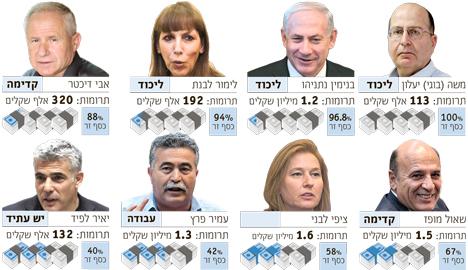More than half of contributions to Israeli politicians come from foreign sponsors
Among political parties, Likud raised the highest percentage abroad - 67 percent - while Kadima raised 65 percent overseas. By contrast, Meretz raised zero percent overseas and Habayit Hayehudi raised four percent of its contributions from foreign sources.
Meretz leader Zehava Gal-On, whose party members raised campaign funds only in Israel, said contributions from abroad could give foreign individuals or bodies improper influence on Israeli politics. "Politicians should be accountable to the public. As long as they raise money transparently, the public must be permitted to judge them in the elections," she says.
Former State Comptroller Micha Lindenstrauss proposed banning by law contributions from donors who are not eligible to vote in Israel. In his 2006 report Lindenstrauss questioned "whether people without any affiliation and ties to Israel should be allowed to influence, even indirectly, its democratic procedures."
Politicians raise contributions mainly to finance their party primaries. The parties, financed by the state according to their size, are prohibited from receiving money from abroad. Party leadership candidates may raise up to NIS 11,000 from a single donor, but the number of family relatives who may contribute is not restricted. Thus, Prime Minister Benjamin Netanyahu received several donations from members of the Falic family of Miami, Florida.
Knesset candidates may raise up to $10,000 from a single donor. Contributions to oneself are unlimited. Businessman Erel Margalit contributed NIS 1.2 million to his own campaign for Labor's leadership, and Naftali Bennett gave himself NIS 150,000 for the Habayit Hayehudi primary.
Israeli politicians have two fundraising methods. The first, used by Labor leader Yacimovich and Moshe Feiglin of Likud, is to raise several small contributions, mainly from Israelis. The other way, favored by Netanyahu, is raising large sums from a small number of contributors, mostly from abroad.
The latter method proves much more beneficial. A foreign donor contributes an average of NIS 12,565 - five-and-a-half times more than an Israeli one, whose average contribution is NIS 2,260.
This means a relatively small group of about 550 foreign contributors are responsible for the big money behind Israel's politicians.
The date for Likud's primaries has not been set, but party members have begun raising funds. At this stage, 261 foreign nationals have contributed NIS 2.72 to Likud members - 67 percent of the contributions they have raised so far.
Aside from Netanyahu, Ya'alon and Livnat, the most popular Likud leaders with foreign donors were Public Diplomacy and Diaspora Minister Yuli Edelstein, who raised 73.5 percent of his NIS 208,000 abroad, and Education Minister Gideon Sa'ar, who raised 69.2 percent of his NIS 329,000 overseas.
Dr. Emmanuel Navon, who is contending for the immigrants' slot on the Likud's Knesset list in the coming elections, raised 60 percent of his NIS 170,000 from abroad.
Tzachi Hanegbi, one of the Likud's wealthiest members, has raised NIS 556,000, 58 percent of it abroad. MK Tzipi Hotovely raised 57 percent of her campaign contributions - NIS 33,000 - in the United States. Moshe Feiglin raised NIS 541,000 from 287 donors, 26 percent of the sum overseas and the remainder from small local contributions.
Kadima's candidates have raised 65 percent of their contributions from abroad. Dan Halutz, who has left the party, raised 93 percent of his NIS 72,000 from abroad. Avi Dichter raised 88 percent of his NIS 320,000 overseas. Shaul Mofaz raised 67 percent of his NIS 1.475 million abroad. Tzipi Livni raised 58% of her NIS 1.6 million from foreign sources.
Yair Lapid has raised NIS 132,000 for his party from 38 donors, 40 percent of the money from overseas.
Labor's members raised NIS 4.1 million in contributions for the primaries, 38.5 percent from abroad. Dr. Roby Nathanson raised 87 percent of his NIS 87,000 from overseas. Next, in terms of percentage, comes MK Isaac Herzog, who raised about half of his NIS 1.2 million from abroad, followed by Amir Peretz, who raised 42 percent of his NIS 1.3 million from overseas.
Yacimovich, who won the primary elections, raised NIS 603,000 from 1,756 donors, only two of them from abroad, who gave small sums each.
Seventy Israelis contributed a total of NIS 57,000 to Meretz candidates for the primary and Knesset elections. Habayit Hayehudi received NIS 660,000 from 105 contributors, only four percent from abroad.
Netanyahu, Ya'alon, Labor and Kadima refused to comment. An aide to Livnat said she receives "contributions in keeping with the law and state comptroller's instructions and reports her activities as required."
Shlomo Raz, spokesman for the State Comptroller's Office, said the comptroller will refresh the rules for the potential candidates ahead of the upcoming elections, stressing the importance of submitting accurate reports. Raz called on the public to follow the reports posted on the comptroller's site and advise the comptroller's office of any relevant information.
The state comptroller is responsible for making sure the candidates' expenses correspond to their income. The reports of the candidates' contributions are posted on the comptroller's website, but they are sometimes sketchy or incomplete. Some reports do not make it clear whether the contribution was in shekels or dollars and what the exchange rate was. In this article we used the exchange rate listed on Sukkot - NIS 3.8807 per dollar.
In some cases the donor's residence is listed only as "New York," without specifying whether it's the state or the city. MK Shlomo Molla of Kadima reported of a donor from "Arlington, USA," as did Avi Dichter; there are seven cities by that name in the United States. Jacob Edery, of Kadima, reported a NIS 10,000 contribution from Ilan Oren of "P.O.Box 94." Numerous politicians write the names of cities in the world in Hebrew, causing transliteration errors.
By Chaim Levinson

